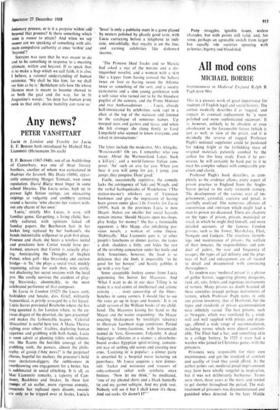Any news?
PETER VANSITTART
Lucia in London and Trouble for Lucia E. F. Benson both introduced by Micheal Mac Liammeir (Heinemann 30s each) E. F. Benson (1867-1940), son of an Archbishop of Canterbury, was one of three literary brothers, another of whom was caricatured in Hadrian the Seventh. His Dodo (1894), appar- ently concerning Margot Tennant, won some reputation. David Blaize must linger in some school libraries. The Lucia series, high up in prewar light fiction ratings, are unexacting snipings at vulgarity and snobbery centred round a heroine 'who charms her visitors with- out any charm of her own.'
'Lucia,' strictly Mrs Lucas, is easy, still familiar game. Go-getting, a living cliché, hor- ribly cultured, with opinions licked off Sunday papers, the Beethoven hair in her locket long replaced by her husband's, she bends indomitable willpower to grab first place. Poseuse and sham, she hears a wireless recital and proclaims how Cortot would have per- formed, unaware that Cortot is actually play- ing. Anticipating the Thoughts of Stephen Potter, when golf—like Stravinsky and auction bridge—is 'In,' she plays a social rival, meekly requesting advice for each shot, wins easily, not disclosing her secret sessions with the local pro. She coolly survives the accident of play- ing Stravinsky, abominably, to the most celebrated performer of that composer.
In Lucia in London (1927) the Lucas aunt, bedridden and lunatic, dies. Grief, militantly hypocritical, is privily assuaged by a fat legacy. Lucia leaves provincial Riseholm where she has long queened it, for London where, to the en- vious disgust of the deserted, she 'gets presented' and makes the fashionable leagues. 'Celestial Mozartino' is useful here too. A Maria Theresa sighing over others' frailties, deploring human appetites and grabbing with both hands, Lucia is soon adroit at planting titbits with column- ists. She flaunts the horrible courage of the grubbing snob, the powers, almost the philo- sophy, of gossip ('Any news?' is the perpetual chorus, hopeful for malice), the procurer's hold over invitation-diggers, the ruthlessness in overthrowing one engagement for a better. Sex is sublimated in social clinching. It is all, as Mac Liammciir remarks, a tapestry of Can- dours, Backbites and Snakes. In these last stumps of an earlier, more vigorous comedy, innuendo has replaced open dissent, swords are only to be tripped over at levees, Lucia's
'lover' is only a publicity stunt in a game played
' by neuters polished by ghastly good taste, with Lucia curtseying before a telephone to indi- cate, untruthfully, that royalty is on the line; and earning celebrities like dishonest income.
'The Princess liked freaks and so Marcia had asked a star of the movies and a dis- tinguished novelist, and a woman with a skin like a kipper from having crossed the Sahara twice on foot or having swum the Atlantic twice or something of the sort, and a society caricaturist and a slim young gentleman with a soft voice who turned out to be the bloodiest pugilist of the century, and the Prime Minister and two Ambassadresses . . . Lucia, already half-intoxicated by celebrities, sank rapt in a chair at the top of the staircase and listened to the catalogue of sonorous names. Up trooped stars and garters and tiaras. and when she felt stronger she clung firmly to Lord Limpsfield who seemed to know everyone, and raked in introductions.'
The latter include the modernist. Mrs Alingsby. 'Wordsworth? Oh yes, I remember who you mean. About the Westmorland Lakes. Such a kill-joy'; and a world-famous Italian com- poser. 'An' such an aria for you. When you hear it you will jump for joy. I jump, you jumps, they jumpino. Dam' good.'
Facile, occasionally repetitive, the comedy lacks the astringency of Saki and Waugh, and the verbal harlequinades of Wodehouse. ('The station-master's whiskers are of Victorian bushiness and give the impression of having been grown under glass.') In Trouble for Lucia (1939), back in the provinces Lucia is now Mayor. Stakes are smaller but social hazards remain intense. Should Mayors open tea-shops, play bridge for money? She has a formidable opponent, a Mrs Mapp, also inhabiting pre- vious novels, a woman of some finesse. 'Habitually,' Mac Liammeir puts it, 'at other people's luncheons or dinner parties, she tastes a dish, shudders a little, and hides the rest of the revolting concoction under her knife and fork. Sometimes, however, the food is so delicious that she finds it impossible "to be good for her hostess" and hastily gobbles it up with a wry face.'
Some acceptable foolery comes from Lucia appointing this horror her Mayoress. And 'What I want to do in our dear Tilling is to make it a real centre of intellectual and artistic activity . . . strict censorship of the films: benches in sunny corners. I should like to see the rates go up in leaps and bounds.' It is an adult version of the William books of my child- hood. The Mayoress kissing her hand to the Mayor and the waiter responding: the Mayor enacting Shakespeare by torchlight (electric) to illustrate Jacobean stage conditions. Period interest is funny-facetious, with housemaids named de Vere, Grosvenor, Foljambe. A dead budgerigar officiates at a séance; a planchette- board evokes Egyptian spirit-writing, conveni- ent way of settling old scores and creating new ones. 'Listening in' is popular: a dinner party is unsettled by a hospital nurse lecturing on pyorrhoea. Mr Lucas acquires a new dinner- suit. 'Jacket and waistcoat and trousers of ruby-coloured velvet with synthetic onyx buttons. "Now let me think," he meditated, "one of my pleated shirts and a black butterfly tie and my garnet solitaire. And my pink vest. Nobody will see it but I shall know it's there. And red socks. Or daren't I?"'
Puny : struggles, ignoble issues, sexless charades, but with points still valid, and, for some, perhaps an agreeable switch from larger but equally vile societies spouting with polemics, bigotry and bloodshed.


































 Previous page
Previous page